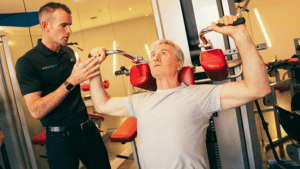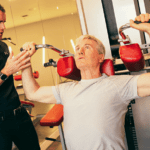No one is exactly pumped about getting older! Often it’s something that people dread. If you are approaching 30 or 40, it’s more than likely that you will have spent some time focused on mastering some crucial skills to ensure you have a successful career, to take care of earning and saving but what about your health and wellness? Did it take a back seat?
Here is a checklist that can help you see where you stand and what areas to work on.
Self-care Checklist For People in Their 30s
1. Upgrade Your Nutrition
When you’re in your 30s, you’re coming into your own. Your energy is still high and you’ve learned a lot about what you want from life.
You also might notice that your metabolism has started to slow down a bit.
Consider adding more fruits & veggies. Get rid of the processed/empty calorie foods in your kitchen. Focus on nutrient-dense foods that are rich in vitamins and minerals.
2. Upgrade your workouts.
Make time for workouts most days of the week. Include: resistance training to build muscle (which will increase your energy) and improve bone health, and flexibility sessions to keep your muscles balanced and limber.
3. Fine-tune your sleep.
Added responsibilities can make sleep a challenge. Create a night-time routine to help you wind down. Remember: Your body works hard while you sleep. (Add LINK to new resource)
Among other things, your brain repairs itself, recovering from the day before and building new pathways to help with memory, focus, and performance. Not only that, but it also releases growth hormone, which helps your body recover from your workouts.
4. Optimise your time.
Come up with simple meal planning/prep routines and find workouts that fit into your schedule.
5. Make room for family.
If you’re planning on expanding your family, follow your doctor’s advice on optimising your hormones and general health.
6. Manage your stress.
Include regular meditation, journaling, breath work, or other activities to help manage stress in your life.
Self-care Checklist For People in Their 40s
In your forties, the momentum you built earlier really starts to pay off in your career, relationships, and other activities.
It’s time to hone in on the things that make your body feel best. During this decade this sometimes can seem like a moving target.
1.Pay even more attention to your nutrition
Your metabolism may have slowed down even more. You might start to notice hormonal fluctuations that interfere with your sleep, mood, and that might cause food cravings. So:
- Eat a wide variety of nutrient-rich foods like fruits & veggies and lean proteins to get the micronutrients your body needs.
- Cut back on foods that don’t agree with you, which you might find happening more frequently now. Think about adding probiotics to help improve your digestion.
- Eat foods that fight inflammation, which is linked with many chronic diseases. Consider including healthy fats like omega-3 fatty acids, which also support brain health.
Talk to your doctor about diet considerations or supplements to improve bone health.
2. Sculpt A Strong & Resilient Body:
You may need more recovery between workouts (especially high- intensity). You may not be as flexible as you used to be – and might have more aches and pains. So:
- Make strength and resistance training a priority. This helps slow age- related muscle loss, preserves bone, and it can help your body regulate blood sugar levels.
- Keep your muscles and joints limber through mobility and flexibility workouts. Yoga can be an option that also helps reduce stress.
- Try adding 2 to 3 high-intensity workouts a week. These workouts bring with them a bonus benefits: They help promote the release of muscle-building hormones plus they burn more calories and speed up an otherwise slowing metabolism.
- Explosive exercises can also improve muscle elasticity, which reduces as you get older. Work with a coach or experienced trainer to help safely push your limits to improve fitness.
3. Carve out “you” time.
For example:
This is a time of life when you can feel pulled in many different directions. You may have less “you” time as you juggle the demands of caring for family members with your career. So:
- Try to make time every week for hobbies, fun pastimes, or other self-care activities that you enjoy.
- Keep your brain challenged by learning new skills and trying new things.
One word sums up the key to feeling healthy & fit at every age …that is “LIFESTYLE”.
Bottom Line – It’s the little choices you make every day that help you feel fit, vibrant, and strong … or leave you feeling tired, blah, and bloated.
Some of these tips work for everyone, no matter your age or gender. They can help you create a foundation of health and wellness that you can build on.
Hope you found the post useful. Do share if you wish to add to the checklist.







